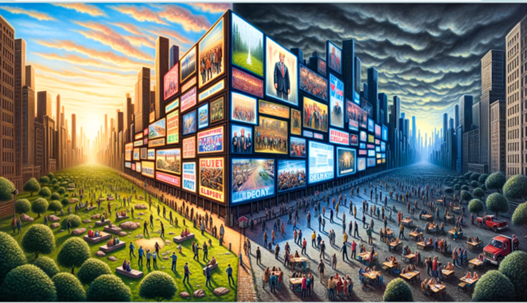The Stark Reality of 'Election 2024!' and the Inevitability of Authoritarianism

As we approach "Election 2024!", the stakes extend far beyond the immediate political outcomes. This election symbolizes a critical juncture in our societal evolution, a moment where we decide the nature of our engagement with the world around us. The choice we face is stark: Do we continue to be passive consumers in a media landscape saturated with spectacle and sensationalism, or do we assert our agency, demanding a media that encourages active engagement and critical thinking? This decision will shape not only the political landscape but the very fabric of our democratic society.
The current trend towards passive consumption is not merely a matter of changing media habits. It represents a deeper shift in our collective psyche. The constant bombardment of sensationalized news, the blurring of lines between fact and fi ction, and the emphasis on entertainment value over informative content have led to a populace increasingly disengaged from the realities of governance and policy. This disengagement poses a grave threat to the democratic process. Democracy thrives on informed, active participation. When citizens are reduced to mere spectators, democracy itself starts to wither, paving the way for demagoguery and authoritarianism.
ction, and the emphasis on entertainment value over informative content have led to a populace increasingly disengaged from the realities of governance and policy. This disengagement poses a grave threat to the democratic process. Democracy thrives on informed, active participation. When citizens are reduced to mere spectators, democracy itself starts to wither, paving the way for demagoguery and authoritarianism.
On the other hand, a media landscape that fosters engagement and critical thought can act as a bulwark against these tendencies. By promoting informed discourse, encouraging diverse viewpoints, and prioritizing depth over sensationalism, the media can empower citizens to make thoughtful, well-informed decisions. This kind of media environment is essential for the health of a democratic society. It nurtures an electorate that is not only informed but also engaged and capable of critical thought.
The upcoming election is, therefore, a referendum on the type of society we wish to live in. Do we want a society where media serves as a tool for enlightenment and empowerment, or one where it acts as an opiate, dulling our senses and our engagement with the world? The choice we make will have long-lasting implications, shaping the political, social, and cultural landscape for years to come.
As we navigate the tumultuous waters of "Election 2024!", it is imperative that we reflect on the role of media in our lives and our society. We must recognize the power of media not just to inform but to shape public perception and discourse. Our decision at the polls is a decision about the kind of media we want to define our society. By choosing leaders who understand and respect the critical role of an informed electorate, we can steer our society towards a future where media uplifts and empowers, rather than diminishes and distracts.
"Election 2024!" is more than just a political event; it is a moment of reckoning for our democracy. It is a call to action for all of us to reevaluate our relationship with the media and to demand a standard that upholds the principles of democracy. Our collective response to this call will determine not only the outcome of this election but the future trajectory of our democratic society.
The uncomfortable truth, illuminated by the insights of thinkers like Aldous Huxley, Neil Postman and their ilk, is that the allure of entertainment often overshadows the pursuit of educated discourse. Huxley's prophetic words in "Brave New World" warned of a society so inundated with distractions that it becomes blind to authoritarian control. Postman, in "Amusing Ourselves to Death," echoed this sentiment, observing how public discourse becomes degraded when entertainment becomes the primary objective of our media.
Drawing from these insights, it becomes increasingly clear why the trajectory of national politics seems to align with the science fiction visions of authors like Huxley, H.G. Wells, and Kurt Vonnegut. The pattern is disturbingly consistent: a society captivated by entertainment is more susceptible to the rise of authoritarian figures. These leaders, often emerging as a response to the perceived inadequacies of the existing system, capitalize on the spectacle and emotion rather than rational discourse and democratic principles.
Thus, the potential election of Donald Trump can be seen not as an anomaly, but as an outcome almost preordained by the current media landscape and our collective societal choices. The preference for entertainment over education, for spectacle over substance, paves the way for such a leader. In this context, Trump's rise is not just a political phenomenon but a cultural and media-driven inevitability.
"Election 2024!" offers us more than a choice of leadership; it presents a critical reflection on our societal values and priorities. The writings of Huxley, Postman, and their contemporaries are not just cautionary tales; they are stark reminders of the potential consequences of our media consumption choices. As we approach the election, it is imperative that we heed these warnings and strive for a media environment and a society that values education, critical thinking, and democratic principles over the seductive allure of entertainment. Only then can we hope to steer our course away from the ominous predictions of these visionary authors and towards a future that upholds the true ideals of democracy.
Photo credit: DALL-e.

